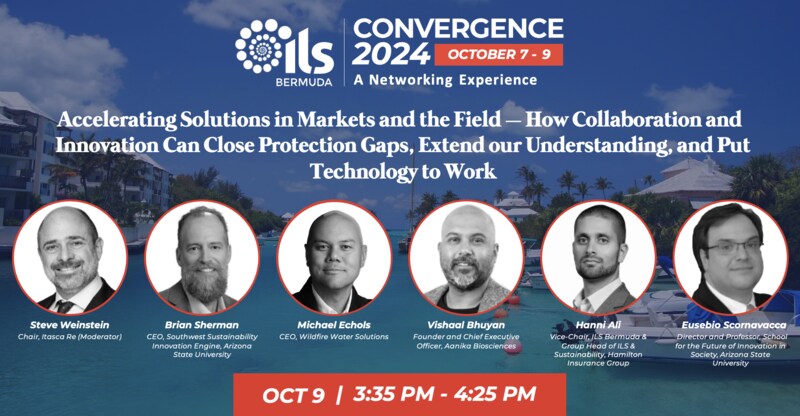2024 Convergence: Symposium On Climate Risk
Convergence 2024 will hold an Innovation Symposium on October 9 to discuss innovation in scientific research and the ILS marketplace, focusing on climate risk and resilience.
A spokesperson said, “Convergence 2024, the premier event in the ILS marketplace, and the Bermuda Institute of Ocean Sciences, are collaborating to support a discussion on accelerating innovation in both scientific research and the marketplace.
“During the afternoon of October 9th, ILS Bermuda and BIOS, which recently merged with Arizona State University, are partnering to host an afternoon Innovation Symposium with a series of sessions dedicated to the theme of Converging Innovation: Accelerating Science and ILS Solutions.
“One of the highlights of the October 9 afternoon symposium will be a panel discussion titled Accelerating Solutions in Markets and the Field – How Collaboration and Innovation Can Close Protection Gaps, Extend our Understanding, and Put Technology to Work.
“This session will highlight how leaders from business and scientists are pushing the edge to enhance our understanding of emerging risk, create and measure adaptation and resilience solutions, and accelerate new products, coverages, and solutions to market.”
The panel includes:
- Hanni Ali, Group Head of ILS & Sustainability at Hamilton Insurance Group
- Vishaal Bhuyan, Founder and Chief Executive Officer, Aanika Biosciences, whose customized microbial-based tags support risk transfer and financial transactions, provide insights about supply chains, and guide consumption choices
- Mike Echols, Chief Executive Officer, Wildfire Water Solutions, pioneering a high-volume water network for wildfire risk management incorporating both suppression tactics as well as continuous water conveyance in the effort to save lives and prevent property damage
- Eusebio Scornavacca, a professor at ASU’s School for the Future of Innovation in Society, and Thunderbird School of Global Management, and expert in digital, AI and related matters
- Brian Sherman, Chief Executive Officer, Southwest Sustainability Innovation Engine, which aims to transform water security, renewable energy, and net carbon emissions in the US Southwest
Steve Weinstein, Chair of BIOS and ItascaRe, panel moderator for the session, commented, “A glimpse at recent news, including Hurricane Helene, dangerous wildfires, extreme heat, and issues with tainted food in the supply chain, are all reminders of significant and growing needs to promote physical resilience and life safety from rising and emerging risks. Our panel, comprised of leaders on the front lines of scientific and technology-enabled business innovation, will discuss how their organizations pursue game-changing ideas and collaboration to bring new solutions to market.
“Bermuda, an ideal jurisdiction for innovation, is the perfect backdrop for this conversation, and ILS Bermuda, a community globally recognized for continual innovation, is an ideal partner and host.”
The spokesperson said, “The afternoon Innovation Symposium will conclude the two-day event, whose theme this year focuses on the critical challenges of our time—including climate risk, resilience, and market evolution, promising to deliver impactful insights from leaders across the insurance, financial, and scientific communities.
“Additionally, sessions will include a broad range of ILS market thought leaders, alongside science innovators, regulators, managers, and analysts. A full list of our sessions can be found at https://ilsbermuda.com/convergence.
“Convergence 2024 is an annual, highly anticipated networking event for thought leaders, innovators, and decision-makers in the ILS and reinsurance space. This year’s event will demonstrate how the convergence of regulatory innovation, cutting-edge science, and market forces is driving the future of risk management and resilience.
“To register for this year’s event, taking place on October 7 – 9, visit https://ilsbermuda.com/convergence.”



CLIMATE CHANGE
A general over view of what you get by just looking out or up.
Climate change has affected our planet for many of years since day one of the Big Bang we are talking of bilions of years here even that bang bit is debatable.
The chicken and egg theory .
Ask you self what type of matter or energy came before or be in existence in order to create the Big Bang ? some say started the size of a pin head.
All you have to do is study the universe to get some of your assumptions turned into confusion relating to the universe enormity .
Our Suns light take 8 minute to get here , heat takes little longer ..
You may find planets none of which is livable by any bodies standards , either too hot or too cold , with no sign of life.
No Boogy men. !
Our Moon is comprised of left over bits when another planet crashed into Earth.
Earth is 13.2 billion years old man kind have been around for 2 billion years.
The nearest star to earth . ( we call it SUN ).
There are star bigger than our Sun do the same thing having collisions this is caused by magnatism and gravity.
Recently two enormous celestial bodies of a size beyond human comprension with a flash of energy billion time that of our Sun. collided.
When two black holes so enormous as they consume planets collide an become one the amount a power or energy released becomes unimaginable.
With the on going expansion of the universe in time our galaxy the Milky Way and that of Andromida.galaxy are destined for collision which will consume planet Earth